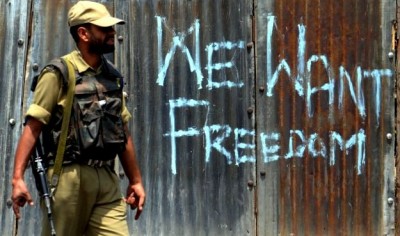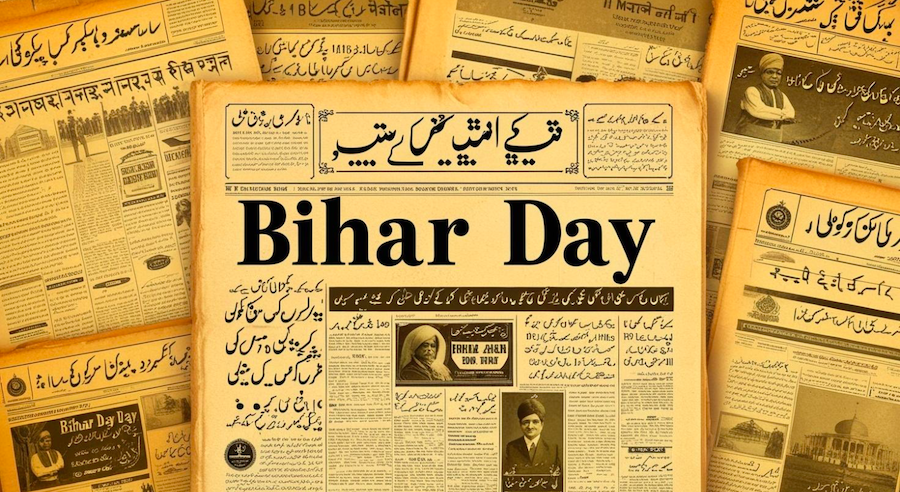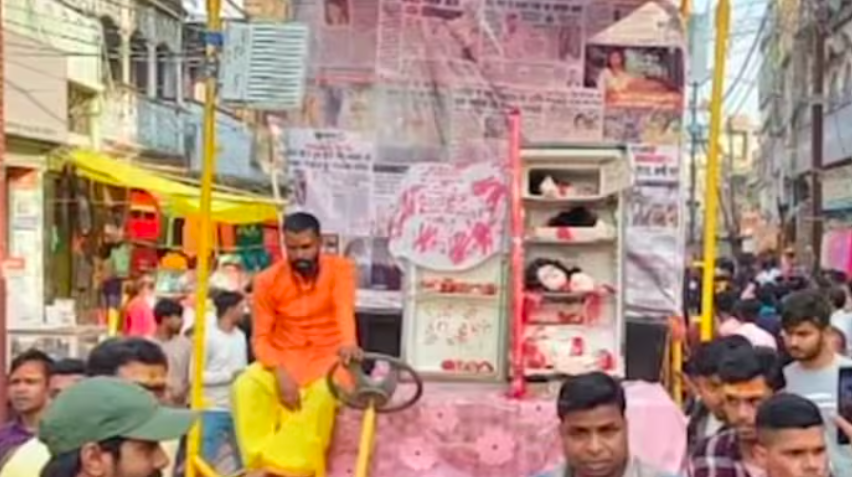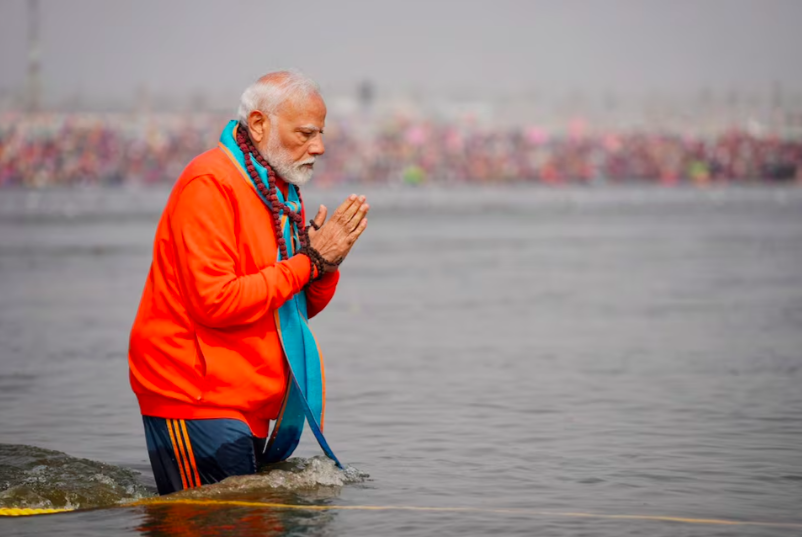Aman Kaleem for BeyondHeadlines
“ .. I admit you are my ruler. It is not necessary to debate the question whether you hold India by sword or by my consent. I have no objection of you remaining in my country, but although you are the ruler, you will have to remain the servant of the people.” – Gandhi, Hind Swaraj -1906
“ this has not been said to you in arrogance, you have great military resource. Your naval power is matchless. If we wanted to fight with you on your own ground, we should be unable to do so, but if above submission be not acceptable to you; we ceased to play the part of the ruled. You may if you like cut us in pieces. You may shatter us at the cannons’ mouth. If you act contrary to our will we shall not help you and without our help we know you cannot move one step forward”- Gandhi. Hind Sawraj- 1906
The idea of nationalism has had a number of avatars depending on time and space. The term originates with the evolution of modernity. It is one of the inherent values of the western modern society. There are a number of views which scholars have taken to analyze the idea, starting with Kedourie who takes a very violent view of Nationalism. According to him ‘Nationalism as an ideology is irrational, narrow, hateful and destructive. It is not an authentic product of any non- European civilization which, in each particular case, its claims as its classical heritage. It is wholly a European export to the rest of the world. It is also one of Europe’s most pernicious exports, for it is not a child of reason or liberty. But of their opposite, of fervent romanticism, of political messianism whose inevitable consequences is annihilation of freedom.’[1] Argument by Kedourie cannot be dismissed looking at the history of the nation- state. The idea of progress in the industrialized way where liberation is associated with creation of a nation state and homogenizing the culture to control that state are very colonial and therefore, imported arguments. In a country where it is impossible to achieve this homogeneity, the dissent from various sections in inevitable. How does democracy provides that space where homogeneity is not strived for and diversity in society is accepted? Is democracy which is also a product of modernity, resists that hateful and destructive nationalism which Kedourie is talking about? To save the democracy a nation erupts with nationalism. This is evident in a number of parts of India where nationalism rises to its peak when the great institution of democracy is in danger. How democracy defines that line between jingoism and nationalism where ‘annihilation of freedom’ does not happen and if does, how can we call it democracy? Is nationalism an inevitable part of any political struggle? If it is then, how any institution articulates the greatness of its own nationalism, over the other? Is it that ‘Utopia’ which western nations sell to developing nations? Hans Kohn makes distinction between ‘western’ and ‘non-western’ nationalism and later between ‘good’ and ‘evil’ nationalism. [2]Nationalism which is ‘evil’ defined by Kohn, is from whose perspective? Will the colonizer in the history as well as in the future will define what is ‘evil’ and what ‘good’ nationalism is? The ‘giant abstraction’ [3]of the word leads to forms of violence by the state which remains masked under this overarching idea of nationalism.
“Anthoy Smith disagrees with Kedourie arguments as one sided misrepresentation. He believes that it overlooks the advantages and blessings of nationalist revivals. Nationalism has often had a great humanizing and civilizing influence. Besides it is misrepresentation to portray nationalist politics merely as a secret conspiracy and terrorism or nihilism and totalitarianism.”[4] This propagation of nationalism has been the argument taken by the modern state in which politics of the colonizing state is justified, in doing so, using the argument of, civilizing the world. What happens if the civilization has different meaning for different people? Gandhi is close to Kohn in his interpretation of Nationalism where he defines his nationalism as superior to his colonizer. He debates with Tagore arguing “Indian nationalism is not exclusive, nor aggressive, nor destructive. It is health- giving, religious and therefore humanitarian”[5]. Tagore detects it as a threat to individual freedom. He question’s Gandhi on being the ‘idolized leader’ who has bonded the nation in dogma. Tagore’s opinion of non-cooperation movement expresses his disagreement with Gandhi on the issue. He says “So, in the excited expectation of breathing the air of new- found freedom, I hurried back to my homeland. But what I have seen and felt troubles me. Something seems to be weighing on people’s sprit; a stern pressure is at work; it makes everyone talk in the same voice and make the same gestures”[6] Tagore did not agree to compromise individual liberty to achieve the collective identity. Gandhi on the other hand, did not adhere to ideas propagated by modernity. He wanted each individual to find their truth from within themselves. He disregards any institution which is imported from the west. He attempts to find his own version of modernity. The problem with this is, nationalism during the ‘Raj’ asserted its freedom from the European domination but in the very conception it remains a prisoner of European intellectuals.
Nationalism is an institution consumed by nation state to save democracy or the pretention of democracy. But how does a state remains democratic with nationalism? The aspiration to become a modern nation state, which is industrialized, has become synonymous with free market in western aspiration. This relationship between democracy and free market has made nationalism more chauvinistic. What if the utopia of the modern state does not come true, and if it does, is it the utopia, in real sense, or are we given a pre- imposed condition to accept the form of progress? What if democracy is consumed by nations, in the process of saving it, using nationalism? Do we have the space to accept the reality beyond this form of society imposed on us or have we become so militant about democracy that, it has to be untarnished, untouched and above all worshipped as an idea without understanding its true meaning.
The second largest democracy of the world, India is the second largest militarized power in the world. It is occupied in saving its democracy from a number of ‘disenchanted’ areas within itself. The failure and the fear of the modern state are established by barrels of guns. The classic case of this is Kashmir. Kashmir has been in turmoil since Partition in 1947 and on a virtual war footing for the past two decades, with some estimates placing the dead at 70,000. It is one of the longest conflicts of the world and certainly one of the most major conflicts in South Asia. It is one of the most militarized zones in the world where every 17 residents are marked by the presence of a soldier. The media has never been able to rise above fatigue, bewilderment and prejudice when it comes to Kashmir. It has partnered with the state to establish the control over people. The populist notion of Kashmir in India has been very pro -Indian nationalism, which has led to xenophobic sentiments towards it.
After the partition in 1947, Maharaja of Kashmir decided not to join India or Pakistan and remained neutral. In the same year the infiltration started with tribes men who were knocking at the gates of Srinagar. Hari Singh appealed to the Indian government for military assistance and fled to India. He signed the Instrument of Accession, ceding Kashmir to India on October 26, 1947. Indian and Pakistani forces thus fought their first war over Kashmir in 1947-48. India referred the dispute to the United Nations on 1 January. In a resolution dated August 13, 1948, the UN asked Pakistan to remove its troops, after which India was also to withdraw the bulk of its forces. Once this happened, a “free and fair” plebiscite was to be held to allow the Kashmiri people to decide their future. After this, three wars were fought between both the countries in the years, 1965, 1971 and 1999 respectively.
In the last ten years Kashmir has seen an upheaval of a different kind which rises from within and questions the legitimacy of Indian state in its territory. The worst of which was in the year 2010, when thousands of young boys were protesting on the streets and screaming slogans of freedom ‘Azadi’. This time it was different, because it was stones against bullets and thundering sounds of slogans against curfews. The political movement in Kashmir and the uprising are not the same thing. The political movement is led by various political parties for different kinds of existence of Kashmir and on the other hand the uprising is for one goal of Azadi. Why Kashmir wants azadi? What do Kashmiris mean by Azadi?
The word Azadi has emerged in the last ten years of struggle of Kashmir. The people of Kashmir refuse to be a part of any nation- state, they want an independent Kashmir. The failure of Indian democracy in Kashmir and its constant assertion of it nationalism by the use of violent force has exploded the demand of Azadi. As Plamenatz writes “In a world in which the strong and rich people have dominated and exploited the poor and the weak people, and in which autonomy is held to be mark of dignity, of adequacy, of capacity to live as befits human being, in such a world this kind of nationalism is inevitable reaction of the poor and the weak” [7]. Weakness is an ambiguous term but if taken in material sense it fits the story of Kashmir. The extreme nationalism implemented by Indian state is evident in various narratives of Kashmiris.
Parveena Ahangar is a 50 year old woman without any formal education. On the night of 18 August, 1990, her son was picked up by the Army who mistook him for a militant during the midnight raid in Batmaloo area of Srinagar. Parveena formed an Association of the Disappeared Children (APDP) four years after the agonizing search for her child. APDP has more than 3000 women as its members with not a single resolved case. The Guardian reported in July 2012 about the discovery of 2,700 mass graves which had 2,943 bodies, 80% of them unidentified. Who are these men? How did they die?
After the report by The Guardian there has not been much mention of these graves in the Indian media. Parvez Imroz, an award-winning human rights lawyer has been fighting for the people of Kashmir for 20 years now. He has filled thousands of habeas corpus petitions in the Srinagar High Court on behalf of the families who claim that their relatives have vanished. These actions have rarely succeeded – they have always been aggressively resisted by the state and the authorities. Parveena has been silently protesting with the mothers of the involuntarily disappeared sons for 18 years, every Friday in the Municipal Park of Srinagar. We have hardly heard of her woes in the national media. We have had hours and hours of debate devoted to Afzal Guru on prime time televisions but we have barely any stories coming from these mothers.
Hundred and thirty two young men were killed in the uprising of 2010. The youngest of them was a seven year old. I was there when the Kashmir was burning in 2010 . I saw a young boy, amidst a huge gathering of mourners, waving a green flag, at Martyrs’ grave yard at Eid Gah, during funeral procession of one of the slain youth in Kashmir , was vociferously chanting pro-freedom slogans. These children are images of anger, anguish, nervousness, insecurity and madness on the streets of Kashmir. They are reflective of not only what they have been through, but what they have been absorbing from the world exposed to them.
“It is likely that you may laugh at all this in the intoxication of your power. We may not be able to disillusion you at once, but if there be any manliness in us, you will see shortly that your intoxication is suicidal and that your laugh at our expense is an aberration of intellect.“[8] – Gandhi in Hind Swaraj. The intoxication of power which Gandhi refers to for the British state has intoxicated the current Indian state, where it has used all forms of repression in Kashmir.
Hans Kohn argues that ‘story of liberation’ has an embedded nationalism in it. There are two kinds of nationalism in Kashmir. One is of the Indian state to establish it sovereignty and other by Kashmiri people to remove that state. The story of liberation of Kashmir has its nationalism close to the nationalism defined by Gandhi. “We have to learn, and to teach others, that we do not want the tyranny of either English rule or Indian rule”[9]– Gandhi in Hind Swaraj. Gandhi dismisses all forms of tyranny and violence. The present modern state of India which has one of the most incredible story of liberty, has declared domination as its victory. Should sovereign be above the people and humanity? What kind of democracy allows repression, misinterpretation and violence on the people which it ‘claims’ to be its own? Does only a piece of land form the nation and not the people residing in it? One of the most astounding facts of any liberation movements is that the sovereign during the struggle resides in its people. It is not in a palace or a capital or an institution, it is within the people who want to create this sovereign. Gandhi says “strength lies in absence of fear, not in the quantity of flesh and muscle on our bodies.”[10] Kashmir is engraving that strength rather weakness in its liberation. What is the normalcy and the peace, which we look for in Kashmir, is it for its people or for the Indian state? Peace is a dangerous word no matter how tempting it may sound. The industry of peace has been consumed by the modern states of west in colonizing the developing nations in the evolved form of capitalism. Sometimes, it uses boots and tankers and sometimes Mac Donald’s and Wal-Mart’s. America says it has restored peace in Afghanistan and Iraq. Israel wants peace in the Middle East by eating Palestine. Money put into a state without understanding its basic moral crisis cannot lead anywhere. We cannot alienate a state and question it for its agony. The denial by Indian State in accepting the movements and resorting to militarily solving a political issue has given more vigor to the movement in Kashmir.
Gandhi writes in Hind Swaraj “In my opinion, we have used the term “swaraj” without understanding its real significance. I have endeavored to explain it as I understand it, and my conscience testifies that my life henceforth is dedicated to its attainment”. Azadi is an ambiguous idea of Kashmir which is beyond the political sovereignty, which lies with its own people, it has been not articulated. The argument of survival of an independent Kashmir is often raised by both Indian and Pakistan state. This argument is the same as the argument used by the British Raj during its occupancy in the Indian subcontinent. The non-concretization of Azadi cannot be held against Kashmiris for they are in the process of finding their own individual truth.
Bendict Anderson writes “Nationalism is not the awakening of nations to self consciousness: it invents nations where they do not exists.”[11] The two form of nationalism by Kashmir and India, adhere to this idea and therefore the rise in vociferous chants on the streets of Srinagar. Any political movement has a romanticism attached to it. The narrative of political struggle gains its dynamism from the poetry, songs or art which is created to celebrate it. One cannot and should not target an individual for being a romantic in Kashmir. The space of dissent, to resist power when it claims rights of people is one of the essential features promised by any democracy. But what if it is denied? Arundhati Roy who has managed to see a bit of unbearableness of life in Kashmir, when she expressed that it is not the integral part of India, the nation unites in rage and anger against her and wants to curb her freedom of expression. We as Indians are so terrified in engaging with the idea of Kashmir that we silence everyone who stands for it. Sanjay Kak made a brilliant film called Jash-ne- Azadi, he never got the censor certificate and the film was screened underground. The film questions the presence of the Indian state in the valley. After the Afzal Guru execution the entire valley was curfewed. The rights of Kashmiris were immediately curbed and they were asked to stay in their houses to protect themselves. Some students and journalist friends who protested on Jantar Mantar were arrested by the Indian state. The group of 40-50 people were surrounded by the larger group of right wing extremists who violently acted against them. The saviors of the Indian state were watching from a distance and mocking at the misery of this group.
It is very easy to be a romantic about Azadi. But , I am not a romantic of Azadi, I am a citizen of this democracy who wants to find faith in its nation and its acts. I was in Kashmir this winter taking workshops of young children affected by violence. It was a group of fifty boys from the age of 4 to 16. I was an alien in their space I knew it, as soon as I entered. I was guilty of living in a country which hangs people to satisfy the ‘collective conscience of the people’ rather than justice. I was ashamed of the world I was creating for these fifty boys where I was wrapping the truth in white sheet of peace and calling it democracy. I was shocked to be there because the rawness of the despair visible on faces of these kids made me feel miserable about the world I lived in. The place did not let me believe in a brighter world where innocence was not evaporating.
“The progress from an absolute limited monarchy to a democracy, is a progress towards a true respect of an individual .Is democracy, such as we know it , the last improvement possible in government? Is it not possible to take a step further towards recognizing and organizing the right of a man? There will never be a really free and enlighten state, until the state comes to recognize the individual as a higher and independent power, from which all its own power and authority are derived, and treat him accordingly”- Henry David Thoreu[12]
India as a nation is sinking in the ‘modular nationalism’[13] where cultural hegemony through the state action has become a part of our democracy. It can see its flaws but it refuses to accept them. Denial has become the delusional reality of its existence. India from a colonized state is becoming a colonizing state and masking it under its nationalism, its state agencies have become instruments in making that mask. It has crushed, dismissed, terrorized, humiliated, and injured anything which has challenged its position. Democracy has been hollowed out in Kashmir and worst fears of nationalism have come true. India has diluted individual rights of men. It has exploded its monsters of nationalism in Kashmir. India cannot rule a state which defies to be ruled by it, at most, it can silence it for a while under barbed wires and AK- 47 but, what will it do when streets are screeching with the agonizing sound of Azadi. How many will it kill on the account of creating peace? How long public opinion will be manufactured in the free market? The true sovereign is one in which the power lies with its citizens. Kashmir right now is finding its sovereign on the streets of Kashmir and not the President’s house in Delhi. The story of India’s liberty in true sense will only come true with the story of liberty of Kashmir.
[1] Nationalism By Elie Kedourie,1960
[2] The Idea Of Nationalism: A Study In Its Origins And Background by Hans Kohn, 1944
[3] Tagore- three essay’s on nationalism
[4] National Identity, Anthony Smith, 1991
[5] Critique of Gandhi from his contemporaries, Rabindranath Tagore and M N Roy
[6] Critique of Gandhi from his contemporaries, Rabindranath Tagore and M N Roy
[7] Modern Political Ideology, Plamenatz, 2002; Nationalism as a problem in the history of political ideas
[8] Gandhi, Hind, Sawarj, 1906
[9] Gandhi, Hind Swaraj, 1906
[10] Gandhi, Hindi swaraj, 1906
[11] Imagined Communities, Bendict Anderson,2006
[12] Civil Disobedience and other essays, Henry David Thoreu
[13] Imagined Communities, Bendict Anderson,2006










